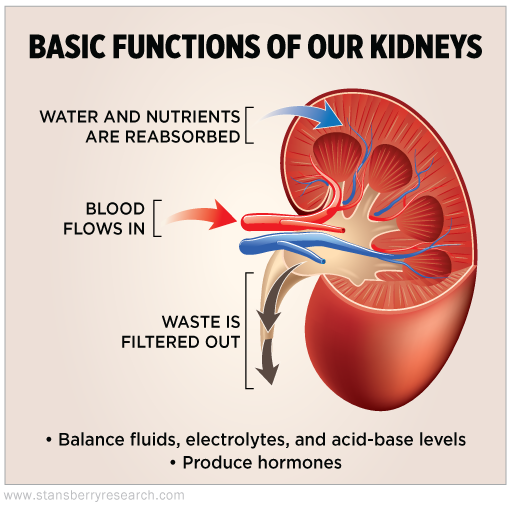Have you acted yet to protect yourself against this silent killer?
It turns out that those heartburn pills we warned you about in January not only destroy your stomach... they also go after your kidneys.
A recent study published in the journal Kidney International found that common heartburn drugs known as proton-pump inhibitors (PPIs) damage kidneys.
The research analyzed people who weren't taking any heartburn meds, those taking PPIs, and those taking H2 blockers (like Zantac and Pepcid). They analyzed how many folks wound up with acute (sudden) or chronic (long-term) kidney disease. What they found was that half of those taking PPIs who developed chronic kidney disease (CKD) didn't have any signs or symptoms beforehand.
[optin_form id="73"]
This means that you can have kidney damage that doesn't show any symptoms until it's pretty advanced. And if you're on PPIs, you have a much higher risk for this happening than if you're on an H2 blocker.
Another study in JAMA Internal Medicine took it even further. In their study, those taking PPIs had an 11.8% risk of chronic kidney disease whereas those not on the drugs was 8.5%.
PPIs, like Prilosec and Nexium, treat acid reflux. And although in some cases those drugs are necessary, they are overprescribed far too often.
These are just the latest studies suggesting that PPIs contribute to the risk of CKD.
Your kidneys are the unsung heroes of your body. They don't get as much attention as your heart, brain, or lungs, but they play important roles in your body.
Think of your kidneys as filters for your whole system. Blood passes through them for cleaning. Your kidneys filter out waste and extra fluid and send these to your bladder. But if you need fluid, your kidneys will reabsorb water and other nutrients like glucose.
In addition, kidneys help keep things in balance. The careful levels of salt and water in your body need to stay in check. Your kidneys even produce hormones that make red blood cells. Plus, they activate vitamin D in your blood.
Today, on World Kidney Day, we want to talk about how to keep these organs healthy. In addition to switching to H2 antagonists (or stopping heartburn med use altogether, if possible), try these other ways to keep your kidneys healthy...
1. Keep your blood pressure under control.
High blood pressure can damage the tiny blood vessels in the kidneys, preventing the kidneys from properly removing waste and excess fluid from the body. Excess fluid in the blood will raise your blood pressure even more.
We've recommended regular exercise, a diet high in veggies and whole foods, and cutting out stress and caffeine to help keep your blood pressure under control. And don't forget, you can keep track of your blood pressure easily without going to your doctor.
2. Eat the right salts.
Low potassium levels are more likely to increase blood pressure than high levels of sodium are. The average American consumes roughly 2,600 milligrams of potassium, much less than the recommended 4,700 milligrams.
To make sure you're getting lots of potassium, focus on eating foods like bananas, tomatoes, and sweet potatoes. Also try to balance the amount of sodium and potassium you consume.
Now, it's important to note that if you already have kidney disease, too much potassium builds up... and that can lead to serious issues. You can learn more about getting the right amount here. If you suspect you might have any kidney issues, ask your doctor to check your potassium levels.
3. Drink enough water.
The standard in the medical world is to tell people to drink up to 64 ounces of water per day. (The rule of thumb is eight 8-ounce glasses per day.) However, the 64-ounces a day recommendation doesn't have a solid footing in evidence. In fact, dozens of researchers have failed to find the origin of this "magic" number.
One possibility is nutritionist Frederick Stare, who wrote in the 40s about the benefits of drinking six to eight glasses of water a day. However, Stare also recommended things like enjoying a Coke as a healthy between-meals snack.
A study that came out in 2012 gave us a more reasonable goal. Researchers showed that drinking 34 ounces of water a day lowers the risk of developing high blood sugar. The study found that people who drank 34 ounces of water per day were 21% less likely to develop high blood sugar than people who drank 16 ounces or less per day.
Researchers think dehydration causes an increase in a hormone called vasopressin. It triggers blood sugar production in your liver, raising your blood sugar levels.
4. Take pain meds sparingly.
Overusing pain medicine contributes to about three to five percent of all CKD cases. That seems low, but if your kidneys are already having some trouble, taking too many painkillers could make them much worse.
Painkillers known as analgesics cause this problem because they reduce blood flowing to the kidneys. These typically include medications like ibuprofen (Advil), naproxen (Aleve), and even high doses of aspirin (though taking a baby aspirin once a day is fine).
Taking more than prescribed or as is written on the label as well as taking for 10 or more days increases your risk of damage. If your doctor has you on these pain pills, ask if you're at risk of kidney damage and if so, what you can do to monitor your kidneys.
What We're Reading...
- The hard truth about kidney health and painkillers.
- Something different: An unorthodox way to grow tomatoes...
Here's to our health, wealth, and a great retirement,
Dr. David Eifrig and the Retirement Millionaire Daily Research Team
Baltimore, Maryland
March 9, 2017

